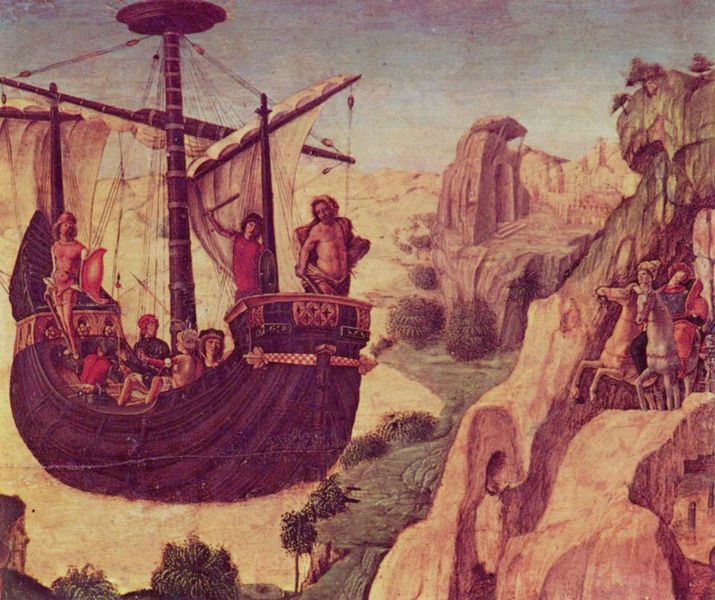| Bon Appetit |
Main » 2011 » March » 22 » Legends & Myths about Georgia
11:44 AM Legends & Myths about Georgia |
The Land of God
"When the God divided the Earth among the people, Georgians were late because of their traditional feast, and by the moment of their arrival the entire world had already been divided. When the God asked them to what they had drunk Georgians just answered:"To you, oh Lord, to us, to peace". The God liked their answer. So told them that although all lands were taken, he reserved a small plot for himself and now he decided to give it to Georgians. According to the God the land was incomparable in its beauty and all people would admire and cherish it forever ".
Jason and the Argonauts 
The first state mentioned as situated in Georgia was Colchis, an ancient kingdom on the Black Sea. The first mention of Colchis by the Greek authors Pindar and Aeschylus dates back a thousand years B.C. It also appears in the myth of the Golden Fleece. The Colchis Kingdom was mainly populated by Kartvelian tribes, but between 1000 and 500 B.C. the Greeks established many trading colonies and settlements along the coast, including Fasis (currently Poti), Pichvnari (Kobuleti), Gyenos (Ochamchira), Dioscuria (Sukhumi), Pityus (Pizunda), to name a few. In late 5th century B.C. the Colchis ceased to exert a political hold on the neighboring tribes, and since then the Colchis Kingdom was limited to the Rioni valley.
It was Colchis where the Argonauts led by Jason landed in their quest for the Golden Fleece. Most geographic locations mentioned in the legend are real and fairly accurately described. The Argo"s destination point, Colchis, is now the West Georgia where Greek colonies were established back in the 6th century B.C. The Greek called Colchis "a land rich in gold". Strabo, ancient Greek philosopher who lived between 1st century B.C. and 1st century A.D. wrote that the real reason behind the Argonauts" voyage to Colchis was that the country was rich in gold, silver and iron. It was Strabo who made a suggestion as to the real prototype of the Golden Fleece when he mentioned the gold-bearing rivers of Colchis and the technique the Colchians used to extract gold "with the aid of shaggy sheepskins". The technique had been used in the mountainous areas of Colchis (currently Svaneti) until quite recently. In the 1940-s ethnographers described it as follows: "A sheep skin pulled over a board or otherwise stretched was put into the river and fastened to make sure it is not drawn by the current and the hairy side of it is turned outwards. The soaked wool would trap gold particles. After a while the fleece would be removed from water and allowed to dry. Then the dried fleece would be beaten to release the gold grains".
Prometheus 
Ancient Greek legend says that Zeus punished the God Prometheus for giving fire to mankind. He was chained to its cliffs and a raven sent to peck at his liver. This story has a curious parallel with the Georgian legend of Amirani - local to the Kazbegi region. The myth of Amirani is fascinating, because its development through the centuries reveals an evolutionary pattern from the time of Mazdaism and Zoroastrianism, through the Greek and Roman occupations of Georgia, to the period of Christianization, and more recently nationalization. Various versions of the myth reveal a process through which the myth was transformed over time, but the legend itself is traced between 2,000 and 3,000 years BC at the beginning of the first Iron Age, as in the myth Amirani defies God by introducing to the human kind the use of metal, and just like Prometheus, he is punished and chained on Caucasus with his cursed dog. Similar to the Prometheus myth, an eagle eats his liver in the day, but it heals itself every night.
|
|
Views: 970 |
Added by: nipara
| Rating: 5.0/1 |
|
|
| Calendar |
| « March 2011 » |
| Su |
Mo |
Tu |
We |
Th |
Fr |
Sa |
| | | 1 | 2 | 3 | 4 | 5 | | 6 | 7 | 8 | 9 | 10 | 11 | 12 | | 13 | 14 | 15 | 16 | 17 | 18 | 19 | | 20 | 21 | 22 | 23 | 24 | 25 | 26 | | 27 | 28 | 29 | 30 | 31 | |
|



